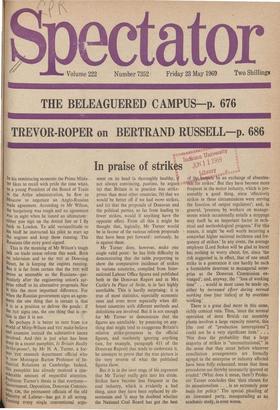In praise of strikes 0"
In his reminiscing moments the Prime Minis- ter likes to recall with pride the time when.
as a young President of the Board of Trade in the Attlee administration, he flew to Moscow to negotiate an Anglo-Russian trade agreement. According to Mr Wilson, the bargaining was tough and no agreement Was in sight when he issued an ultimatum: either you sign on the dotted line or I fly back to London. To add verisimilitude to his bluff he instructed his pilot to start up the engines and keep them running. The Russians (the story goes) signed.
This is the meaning of Mr Wilson's tough talk on trade union reform this week. Both On television and to the Ttic at Downing Street, he is keeping the engines running. But it is far from certain that the TUC will Prove as amenable as the Russians—par- ticularly after the engineering union's sur- Prise rebuff to its alternative proposals. Nor is this the most important difference. For when the Russian government signs an agree- Mein the one thing that is certain is that it is in a 'position to deliver the goods: if the TUC signs one, the one thing that is -or- tain is that it is not.
So perhaps it is better to turn from 1,1e World of Mitty-Wilson and TUC make-believe and examine instead the substantive issues involved. And this is just what has been done in a recent pamphlet, Is Britain Really strike-prone?, by Mr H. A. Turner. a for- ater TUC research department official who is now Montague Burton Professor of In- dustrial Relations at Cambridge. Indeed, this pamphlet has already received a con- 8t!derable amount of respectful attention. _rofessor Turner's thesis is that everyone- -ivernment, Opposition, Donovan Commis- !1_0.n. CBI, the permanent officials of the old Ministry of Labour—has got it all wrong. Turning every single conventional argu- ment on its head (a thoroughly healthy, if not always convincing, pastime, he argues (a) that Britain is in practice less strike- prone than most other countries, (b) that we would be better off if we had more strikes, and (c) that the proposals of Donovan and the political parties, so far from leading to fewer strikes, would if anything have the opposite effect. From all this it might be thought that, logically, Mr Turner would be in favour of the various reform proposals that have been put forward: curiously, he is against them.
Mr Turner does, however, make one single valid point: he has little difficulty in demonstrating that the table purporting to show the comparative incidence of strikes in various countries, compiled from Inter- national Labour Office figures and published both in the Donovan Report and in Mrs Castle's in Place of Strife, is in fact highly unreliable. This is hardly surprising : it is true of most statistics, especially economic ones and even more especially when dif- ferent countries with different methods and definitions are involved. But it is not enough for Mr Turner to demonstrate that the figures are unreliable: by pouncing on any- thing that might tend to exaggerate Britain's relative strike-proneness in the official figures, and resolutely ignoring anything (see, for example, paragraph 411 of the Donovan Report) that tends to understate it, be attempts to prove that the true picture is the very reverse of what the published figures show.
But it is in the next stage of his argument that Mr Turner really gets into his stride. Strikes have become less frequent in the coal industry, which is evidently a bad thing, since they have been replaced by ab- senteeism and 'it may be doubted whether the National Coal Board has got the best ism for strikes.' But they have become more frequent in the motor industry, which is pre- sumably a good thing, since 'effectively strikes in these circumstances were serving the function of output regulators'; and, in general, 'pressure by workers on manage- ments which occasionally entails a stoppage may itself be an important factor in tech- nical and methodological progress.' For this reason, it might 'be well worth incurring a somewhat higher national incidence and fre- quency of strikes.' In any event, the average employer (Lord Stokes will be glad to learn) has nothing to worry about, for, since `the risk suggested is, in effect, that of one small strike in a generation it can hardly be such a formidable deterrent to managerial enter- prise as the Donovan Commission en- visaged'; and, anyway, the ' "loss of working time" . . . would in most cases be made up, either by increased effort during normal working time [our italics] or by overtime working.






































